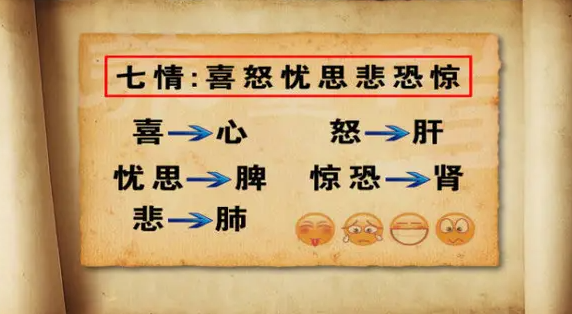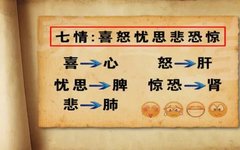| 【Note】The audio is from Teacher Xu Wenbing’s “Huangdi Neijing – Seasonal Health Preservation Methods”, and the text has been organized through audio recognition. |
In Traditional Chinese Medicine (TCM), the causes of diseases triggered by external weather and climate changes are summarized as the “Six Excesses” (六淫), which are “Wind, Cold, Heat, Dampness, Dryness, and Fire”. I have mentioned this in previous programs and have even elaborated on some of them. Meanwhile, TCM attributes the causes of diseases arising from excessive internal emotional changes to the “Seven Emotions”. What are these seven emotions that we often refer to?

The Seven Emotions are more terrifying than the Six Excesses because the Six Excesses harm the body’s exterior, while the Seven Emotions directly affect the heart and mind, leading to internal injuries that can severely damage the heart and spirit. Excessive emotional fluctuations can disrupt the flow of Qi and blood, and in severe cases, can directly disturb the mind, even leading to death.
There is a saying: “A calm heart leads to a peaceful mind,” meaning that when a person is emotionally stable and calm, without ups and downs, the flow of Qi and blood is in the most harmonious and healthy state. Conversely, intense emotional fluctuations disrupt this balance and harmony, leading to chaos and disorder.
The TCM theory of the Seven Emotions causing disease clearly describes the characteristics of these pathological changes. According to TCM theory: Anger causes Qi to rise, great anger harms the liver; Worry causes Qi to stagnate, excessive worry harms the spleen; Sadness causes Qi to dissipate, great sadness harms the lungs; Fear causes Qi to descend, fright harms the kidneys; Joy causes Qi to slow, great joy harms the heart.
As you can see, a person who is originally harmonious can be disturbed by these emotional changes, leading to anxiety and restlessness. If the heart is shattered and the spirit is scattered, severe unease will occur. Patients with depression may experience panic, fear of being alone, and even symptoms of fleeing.
| If one cannot maintain a calm heart, what consequences can arise from anger? Why is it that one cannot eat when angry? |
When a person is angry, Qi and blood surge upwards, as vividly depicted in Yue Fei’s words—”Anger causes hair to stand on end.” Severe upward surging of Qi and blood can lead to elevated blood pressure, rapid heartbeat, and even intracranial hemorrhage, increased intracranial pressure, or brain herniation. If not rescued in time, it can lead to death. Those with pre-existing conditions may find that anger exacerbates their existing ailments. Zhuge Liang’s three provocations of Zhou Yu ultimately resulted in Zhou Yu’s blood vomiting due to anger and death.

Many of us are accustomed to suppressing our anger, enduring grievances. However, whether we swallow this anger or not, doing so harms both our body and mind. The result of suppressed anger is the stagnation of Qi, leading to various forms of blood stasis and tumors.
The TCM concept of Qi stagnation and blood stasis refers to the liver Qi being unregulated and unable to spread. When angry, Qi and blood surge upwards, while eating forces them downwards. This contradictory situation leads to obstructions and stagnation in the esophagus and gastrointestinal tract. In youth or at the beginning, one might still be able to swallow, but later it can lead to nausea and even tumors in the digestive tract.
Therefore, I often remind my patients: do not eat when you are angry. If you are angry or still harboring anger at mealtime, it is best not to eat. No matter how good the food is, it becomes poison when consumed in anger. Wait until your emotions settle before eating.
I also repeatedly remind parents not to scold or reprimand their children during meals. No matter how serious the child’s mistake, wait until after the meal to discuss it. Scolding children while eating is even more inappropriate; it is essentially a form of psychological torment for the child.

